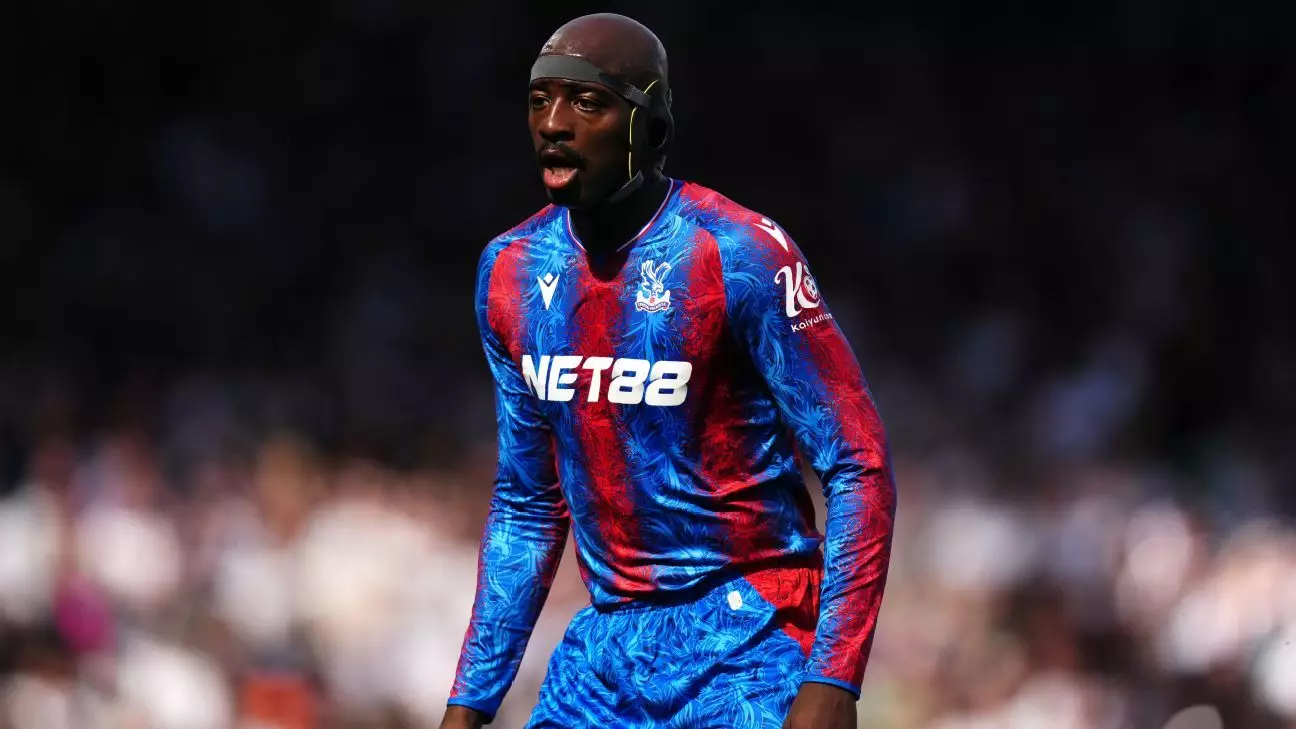Jean-Philippe Mateta’s recent return to the pitch encapsulates the spirit of resilience that characterizes not only the athlete but also the sport itself. Having sustained a horrific ear injury while playing against Millwall, Mateta faced the dual challenges of physical recovery and mental fortitude. With the necessity of 25 stitches after a collision left his ear “destroyed,” Mateta’s journey back to competitive football serves as a poignant reminder of the commitment required in sports, where danger and disappointment are often intertwined.
The incident was alarming. Kicked in the head by Millwall’s goalkeeper Liam Roberts, Mateta was faced with the uncertainty of serious head trauma. In an insightful moment shared with L’Equipe, the player reflected on the sheer vagaries of fate: “I was lucky the outcome was not more severe,” he stated, acknowledging that a last-minute reflex turned what could have been a tragic accident into a less catastrophic one. This level of self-awareness is admirable; athletes tragically often overlook their own vulnerability in the face of competition.
Community and Compassion
What stands out notably in Mateta’s narrative is the sense of camaraderie within the sport. His acknowledgment of Roberts—who later faced severe backlash for the incident—reveals the empathy often overlooked during high-stakes games. Mateta’s ability to reach out to Roberts while still healing is commendable. He emphasized, “I told him: ‘It is OK, it is football.'” This sentiment reveals a mature understanding of the game’s inherent risks and the shared journey of all those involved, whether they wear team jerseys or officiate from the sidelines.
Sporting injuries often rile up emotions; fans, players, and even referees can sometimes get carried away, resulting in significant fallout. Roberts, who experienced the repercussions of the collision both publicly and personally, received threats that weighed heavily upon him. The backlash against him underscores the passionate—and sometimes impulsive—nature of football fandom. Yet, here lies an opportunity for harmony: Mateta’s response is a powerful testament to how athletes can lead by example. Instead of fostering resentment, he chose to communicate compassion.
The Healing Power of Sports
Mateta’s recovery journey is more than a tale of stitches and bandages—it signals a reclamation of normalcy through sports. Returning to the pitch for the FA Cup quarterfinal clash was no small feat, especially when wearing a protective helmet—a visible reminder of his ordeal. Yet, this helmet symbolizes courage, not weakness. It reflects determination, courage, and the unwavering passion that drives athletes to confront their fears head-on. For Mateta, the helmet represents more than protection; it signifies a hard-fought return to his passion.
Crystal Palace manager Oliver Glasner remarked on Mateta’s return, asserting that the forward appears “comfortable” despite the physical limitations imposed by his protective gear. This adaptability speaks volumes not only to Mateta’s character but also to the careful planning and medical insight behind his comeback—a fine blend of risk management and goal-oriented focus.
Looking Beyond the Pitch
While Mateta’s tactical performances on the field have been admirable—evidenced by 15 goals scored this season—there is a more profound narrative at play when examining his evolution as a player and person. Football transcends mere performance metrics; it navigates through human experiences that resonate beyond the confines of the game. Mateta’s ability to balance his physical recovery with emotional and mental resilience creates a richer story than mere statistics could convey.
The support from Crystal Palace staff illustrates a broader understanding of athlete care beyond traditional physical therapy. Mateta’s experience emphasizes the importance of mental health in sports, particularly after traumatic events. The journey back is not simply about physical readiness; it involves emotional tenacity and support networks that encourage recovery. Such insights are crucial in understanding that athletes, while they are indeed warriors on the field, are human beings off it, deserving of holistic care and compassion.
Mateta’s remarkable journey post-injury serves as an inspiration, offering valuable lessons about resilience, empathy, and the power of sport to heal and unite.

Leave a Reply